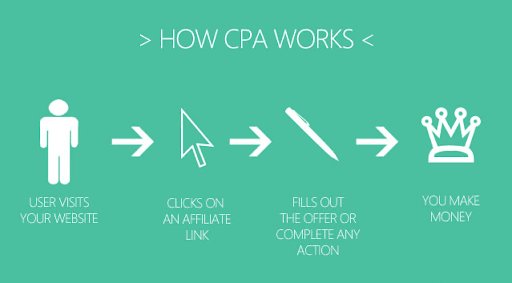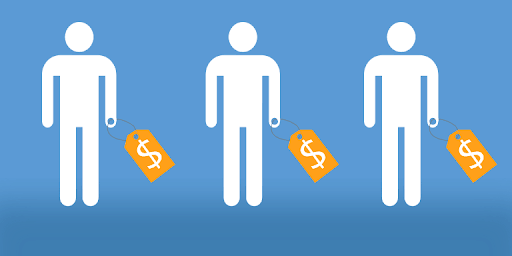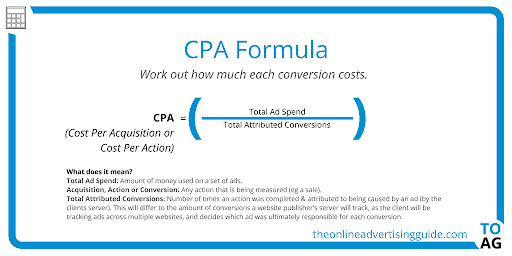Cost Per Acquisition (CPA) is a marketing metric that measures the total cost to acquire a single paying customer for a campaign or marketing channel. Overall, cost per acquisition is an important measurement for marketing success and a way for businesses to determine if their investment in a certain marketing channel is providing them with a maximum ROI.

Why Does Cost Per Acquisition Matter?
Cost per acquisition matters as a metric because it helps businesses measure their return on investment (ROI) and measures whether their revenue is generated efficiently. The majority of other marketing metrics such as conversion rate or visits per page are indicators of success.
Cost per acquisition is a financial metric that is used to directly measure how revenue is impacted by marketing campaigns. Businesses can easily determine an acceptable cost per acquisition by calculating average order value (AOV) and customer lifetime value (CLV).
Overall, it is useful to calculate conversion rates and other measures of success; however, in order to properly address efficiencies (or lack thereof) within an online business, CPA must be calculated and cross-referenced with AOV and CLV.
Where is Cost Per Acquisition Used?
Cost per acquisition is typically used in the following paid marketing mediums:
Pay Per Click (PPC)
Pay Per Click (PPC) is a type of search marketing in which advertisers utilize the Google Ads platform (and other platforms) to target users in search engines. PPC agencies tend to provide a range of services across other platforms such as Facebook, LinkedIn and more.
The goal of PPC is to generate as many conversions as possible at the lowest possible cost. This would be represented by a low cost per acquisition.
Display Advertising
Display Advertising is a type of online marketing in which advertisers advertise with banner ads that appear in designated areas of a website or other social platforms.
The goal of display advertising is to strategically place banner ads on websites or platforms that generate users within your target audience, ultimately converting a higher rate at a lower cost (lowering your cost per acquisition).
Affiliate Marketing
Affiliate Marketing is a marketing strategy where a person or a company can make money by promoting one another’s products or services.
The goal of affiliate marketing is to promote your products or services on a site brings in your targeted audience through search or a following (such as Instagram influencers). This way you are minimizing your cost per acquisition through targeting promotion.
Social Media Marketing
Social media marketing is simply marketing across social media platforms such as Facebook, Instagram, and Twitter.
The goal of social media marketing is to maximize your reach to as many users as possible. These platforms are also used for paid social campaigns, where minimizing cost per acquisition is extremely important to maximizing social media marketing and customer acquisition efficiency.
Content Marketing
Content marketing is a type of marketing that involves strategizing, creating, and sharing content across multiple channels.
The goal for content marketing is to either promote the content on platforms such as Google or LinkedIn and generate conversions with a low cost per acquisition, or implement SEO and generate conversions organically.
In addition to these, cost per acquisition can also be used for e-commerce SEO, email, and other campaign platforms without direct advertising costs but that still need overhead (i.e. indirect expenses and labor).

How Do You Calculate Cost Per Acquisition?
The official formula for calculating cost per acquisition is:
CPA = total ad spend / total attributed conversions
How does this play out in a real-life scenario? Imagine you own an e-commerce company that sells candles. You launch a campaign on Instagram in March of 2019 and spend $800. From this campaign alone your company sells 40 candles on your site. So, what is the CPA?
$2,400 spend / 60 sales = $40 CPA
For this campaign, it costs $40 on average per customer acquired.
It is important to keep in mind that if your company does not sell goods like candles or other items, CPA can still be calculated. A conversion can be demo signups, or form fills.

How to Define a Quality Cost Per Acquisition
When it comes to a quality cost per acquisition, there really is no benchmark to refer to. Each online business is going to have different prices, margins, campaigns, operating expenses, and more.
With this in mind, the best way to define a quality CPA is to understand PPC, content marketing, social media, and how they allow a business to calculate how much they can afford to pay for acquiring new customers. Other factors include budget, the advertising medium, and how you define “acquisition”.
Budget
If you have a limited marketing budget, chances are you’ll be conservative about how much you spend on your ads. With reduced ad spend, companies then have to focus on “low-hanging fruit” – that is, high-converting terms and brand queries that are easy to acquire and execute.
As your budget increases, your campaigns can be expanded to include lower-converting terms that have a higher CPA.
Advertising Medium
Where ad dollars are spent depends a lot on some of the aforementioned factors (PPC, Affiliate, Content Marketing, Social Media, etc). Each has different outcomes, which you must bear in mind when thinking about the results you want to see.
“Acquisition”
Cost per acquisition always refers to how much it will take to acquire paid customers. However, sometimes the metric is applied to secondary campaigns like direct mail listings, newsletter sign-ups, and the like. When thinking about how “acquisition” is defined, it is considered a best practice to use CPA as of the larger metric that connects secondary conversions to the primary conversion: i.e. making a sale.
How Do I Lower My Cost Per Acquisition
Are you struggling to bring down that cost per acquisition? You deserve the best! Our PPC team will drive more leads while substantially dropping CPA. See what we are capable of by getting a free proposal today!